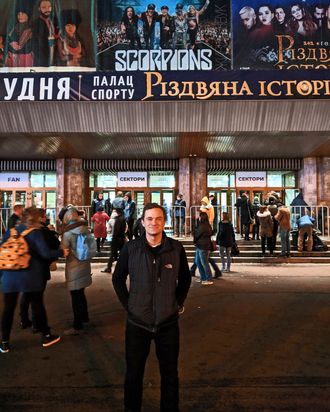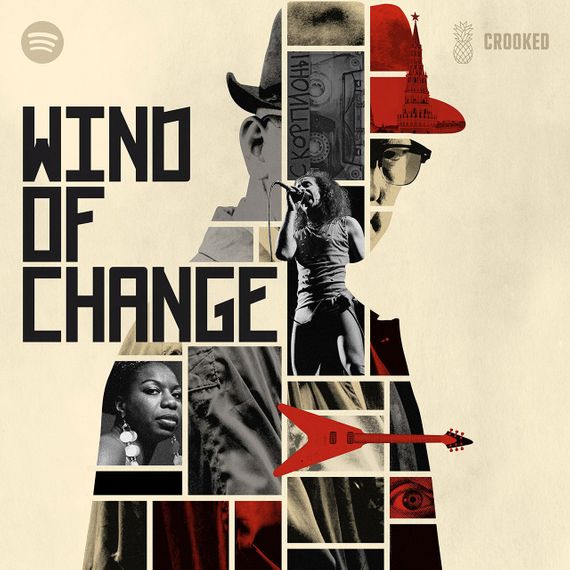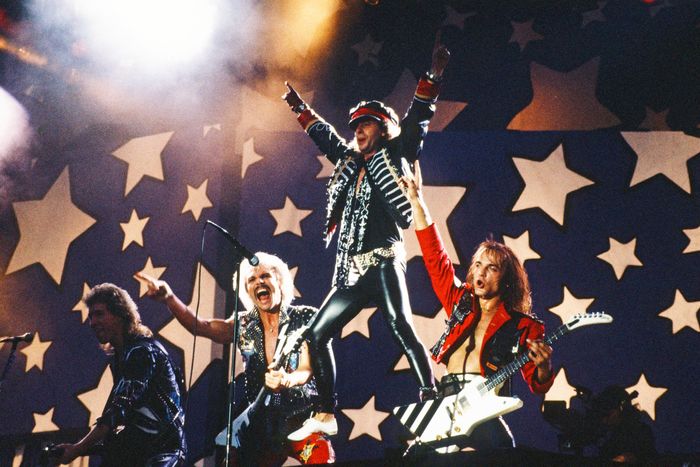
Ten years ago, the investigative journalist Patrick Radden Keefe heard an implausible-sounding rumor from a friend with a history of being proven right about implausible-sounding rumors. It was about the Scorpions song “Wind of Change,” the ruthlessly uplifting 1990 power ballad that became indelibly associated with the fall of the Berlin Wall and the dissolution of the Soviet Union.
The song’s origin story was already pretty good — the band’s singer, Klaus Meine, had written it after playing at the 1989 Moscow Peace Festival, alongside bands like Skid Row, Bon Jovi, Ozzy Osbourne, and Mötley Crüe, inspired by the sight of tens of thousands of young fans absolutely losing it to Western heavy metal for the first time. The story Keefe heard was pretty good, too: “Wind of Change” had in fact been written by the CIA to encourage change in the Soviet Union and bring about the end of the Cold War.
Wind of Change, the new eight-part podcast produced by Spotify and Crooked Media, tracks Keefe’s pursuit of that rumor, which sounds more and more plausible as he traces the story’s origins, speaking to former spies, musicians, band managers, espionage historians, journalists, and tracing the CIA’s long history of dabbling in the cultural sphere. I spoke to him about the podcast, spy craft, the cultural Cold War, and another song that may also have been a CIA job.
What is it about this story that’s held your attention for so long?
Every reporter has some version of this — where there’s some tip that was almost too crazy to follow, and the question is, are you really going to take the plunge and see where this goes? For me, this was that kind of story, and the thing that kept me going was I’ve always been pretty passionate about music and I’ve always been really into spy stories — whether it’s le Carré or Eric Ambler. My first book, Chatter, was about the world of espionage. So for me, the idea that these two very discrete universes that I very much enjoy but that I’d never really thought of as bedfellows had converged in this way was just irresistible. The other thing I’d say is that there are stories, particularly investigative stories, where you get a tip and you go to the well, and you dig, and you come up dry because there’s nothing there. But the weird thing with this story is that every time I went back to the well, there’d be some totally crazy new thing, whether it’s a new character or a completely off-the-wall, hard-to-believe anecdote, and that sustained me along the way.
The podcast is about trying to arrive at an answer to a very specific question — did the CIA write “Wind of Change” — but it’s also a history of the cultural Cold War. How much of that history did you know going in?
When I first got started, I discovered the work of Frances Stonor Saunders, the British historian and writer who’d written this fascinating history of the cultural Cold War 20 years ago, which really blew the doors open on this field. And what was really interesting was that she’d documented this history basically as it regards high culture. It’s kind of comical to think about it now, but the CIA in the ’50s are mostly these extremely upper-crust white men who all went to Yale. They end up in the CIA, and when they’re thinking about the cultural Cold War, they’re thinking about Abstract Expressionism and the Boston Symphony orchestra and The Paris Review and the idea that Jackson Pollock is going to get them to win over hearts and minds in the Soviet Union — which is so quaint, in retrospect.
Something else though, is when you look at the history of this stuff, you can quickly get lost in a web of foundations and front companies, the mechanics of tracing the money and how these efforts worked, and it can get very dry very quickly. It was interesting to me that that was done, but those aren’t necessarily stories that I particularly wanted to tell — I wanted to tell a story about music, which is part of the reason that a podcast was an obvious way of doing it, because I want you to hear the music.
This is the first time you’ve done a podcast. What else does the form allow you to do in comparison to other kinds of reporting?
Everything. For a long time, I wrestled with how to tell this story, and how to make it work on the page, and then I had this eureka moment where I woke up in the night about 18 months ago and realized that what it wanted to be was a podcast. There were two big reasons for that: Music was so central to it, and I wanted to be able to play the music and have listeners hear it, and really feel like you were there. We found all these archival tapes, so it’s not just that I’m playing you songs, but when I tell you the Scorpions went and played the Leningrad rock club in ’88, we have the tape of the performance, and I wanted the visceral quality of that.
The other reason is that there’s something about the intimacy of the podcast medium that allows you to be right there with the person who’s figuring out the story in real time, and feeling the reversals, and experiencing the switchbacks, and having those weird vertigo moments. In a written piece, it would feel overly self-referential to bring that stuff in, whereas in a podcast it’s quite natural, and I figured that if we did it right, the listener would experience that same uncertainty. Particularly when you’re reporting a story about the world of intelligence, it’s a hall of mirrors, and what I wanted to do as much as possible was allow the listener to experience that vicariously.
There are some interviews here where people are talking to me and it’s not at all clear to me whether they’re telling me the truth, or where I sort of have a feeling that they might be lying to me. I don’t want to tell you that — I just want to play the tape, and you let you feel that same sense of discomfort.
There’s something about this story that almost has the ring of being too good to be true. How do you know to trust or pursue something like this?
Some of it was that it came from Michael; so many of the pieces that I’ve done have originated with conversations with this guy. One of my favorite pieces I’ve ever written, a piece for The New Yorker I wrote in 2007, which was about counterfeit wine, very expensive frauds in that world — and the whole thing came because Michael had called me up one day and said, “You’ve got to look into this.” I did, and he was completely right, and there’ve been a bunch of instances like that.
But the biggest thing was that I started looking into how plausible something like this would be. I started going into the history of the cultural Cold War, and the history of the song itself, and all the way along, right up until the experience of talking to a whole lot of ex-spies, and some of the other big interviews in the podcast, where it’s not just people saying, “I want to believe that this is true,” they’re saying, “Yes, absolutely.” Without mentioning any names, I got an email yesterday from a very, very, very senior former White House official who personally worked on influence operations, and who wrote to me and said, “I don’t know this story, but it’s 100 percent plausible. One hundred percent plausible.”
So on the surface, it has that kind of too-good-to-check quality, but then the more I checked into it, just in terms of whether or not it’s credible as an idea, people who were really in a position to know, all the way along, right up until today, have said, “Yes, I could see it.”
There’s this recurring theme throughout the podcast about stories that countries and organizations and people like to tell about themselves, and you speak to all these people within the CIA who sort of confirm one way or another that this is the kind of story the CIA likes to tell about itself. Why do you think that is?
At least part of it, I think, is that if it’s true, this is a story of supreme CIA competence — a totally invisible, bloodless influence operation that might have helped change the course of history. It’s a bit creepy, of course, when you think about it. But next to the kinds of stories we’ve grown accustomed to hearing about the CIA, it’s also pretty impressive. This was part of what was so striking to me about the responses from a bunch of the ex-spies. None of them — not one — said, “We would never do such a thing.” Instead, there was often this palpable sense that they hoped it was true.
In one of the later episodes, you talk about the strangeness of pursuing a story about disinformation and Cold War influence operations at this particular moment in history. How are some of those patterns and practices playing out today?
During the year we spent putting together the podcast, the news was awash in stories about Russian interference in the 2016 election, and about the ways in which the Russian government has used social media to run elaborate influence operations in the United States. So, on the one hand, I felt like we were making a period piece — this very specific story about a different time and place, the fall of the Berlin Wall and the collapse of the Soviet Union. But I was constantly reminded that the long aftermath of that story — the humiliation Russia felt during the 1990s, the spy-versus-spy games between Russian intelligence and the CIA, the use of media and culture for propaganda campaigns — is still playing out, in real time, today.
Who else have you heard from, since it came out?
It’s been amazing, it’s only been out for a few days, but a lot of people have already listened to the whole thing, and it’s been fascinating hearing from Scorpions fans, particularly people who grew up in the Soviet Union or who grew up in Europe, for whom the song meant a lot. There’s also a very rich strain of like, “How dare you call them hair metal?! Technically this is not hair metal,” and getting into these vanishingly fine distinctions. There’ve been a lot of people telling me about where they were in their life when that song came out, and what it meant to them, politically.
And then I’ve been hearing from a lot of people with theories about other acts, and other songs, which is wild. The leading contender, I can tell you now, because I’ve gotten no fewer than a dozen different emails and DMs, is “Right Here Right Now” by Jesus Jones, which came out around the same time. All these people have written and said, “Season two, look into it!”
There’ve been some people who say that they just don’t believe that it’s possible the CIA was involved at all, and there are other people who are convinced that the CIA must have been involved in some capacity, but maybe in a way that the band didn’t even know about. The responses have been all over the map. It’s been wild, and in a way, that’s what I wanted. I’ve been assembling this collage of evidence and looking at it and trying to read it and make sense of it, and to have people come to their own conclusions — whether it’s an overarching CIA conspiracy on the one hand, or that I have wasted years of my life chasing a ridiculous wild goose on the other — I love that. If people listen to it and want to argue amongst themselves, so much the better.
Do you think all this will change people’s opinion of “Wind of Change” as a song? I guess another way of putting that is do you think it’s possible to divorce something like this from its context?
It’s an issue that I wrestled with through the whole process, and I think if we’ve done it right, then you can hear me wrestling with it in real time — the question of how does this change the way you feel about something like a song, and what it means to you to think that it might plug into this wider matrix of geopolitical machinations. I think I came away feeling as though whatever the truth of the story with respect to the CIA and “Wind of Change,” that song meant so much to so many people, in the former Soviet Union and in so many other places as well. The interview isn’t in the podcast, but I ended up interviewing Matthias Jabs, the guitarist for the Scorpions, and he told me they played the song in the DMZ. So it has taken on this resonance for so many people in so many places, and I wasn’t looking to shatter that, but more to complicate it.



